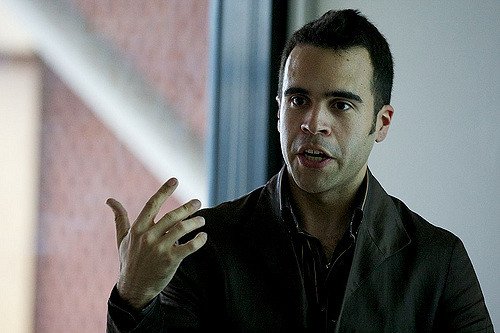Conspiracy and fake news "won't change until people are able to imagine a different future". Marcus Gilroy-Ware & Amisha Ghadiali
Amisha Ghadiali has changed her powerful podcast series from The Future is Beautiful to All That We Are —allowing for a full, deeper, and also darker picture of how human social potential can be realised… in order to stop it going off the rails entirely.
This episode (embedded below, and directly available here) is a great example of her new direction. It’s an interview with the media theorist Marcus Gilroy-Ware, an expert in conspiracy theory in the age of memes and social media.
Here’s the blurb for the show below:
How can we filter and trust information in a world of misinformation?
“Misinformation is a social problem. It’s a cultural problem. It’s a political problem. It’s always been there, it probably always will. The question is, really, how can we manage it.” Marcus Gilroy-Ware
In this episode Amisha talks to Marcus Gilroy-Ware, an interdisciplinary writer and scholar working on media, politics, technology and capitalism. He is author of ‘After the Fact? The Truth about Fake News’ and ‘Filling the Void: Emotion, Capitalism and Social Media’.
Amisha and Marcus talk about how information exists in this time of post-truth. They speak about the overwhelming effects misinformation, fake news, conspiracy theories and conflicting information are having on our ability to make sense of the world.
Marcus believes that vast amounts of money and power are invested to ensure that we don’t know where we are going as a society; a theatre of confusion that is a cultural, social and political problem perpetuating our sense of uncertainty.
They speak about how this confusion and uncertainty effects our personal and collective visions for the future as it is replaced with survival mode eroding our sense of agency and our sense of connection to aspirations we might hold for our future.
Marcus shares his insights into conspiracy theories and how they stem from feelings of disempowerment, which does not necessarily coincide with real disempowerment.
Together they explore how we can establish filters of trust that can help us see through the confusion of headlines, conflicting information and language manipulation we are exposed to by mainstream media and social networks.
They spark awareness that our filters often determine how we understand the world, what kind information comes to us and what information sources we trust.
We learn that filtering information means that we have to be discerning and cultivate nuanced relationships to our sources of information. We have to accept that our worldview will always be partial.
We need to cultivate productive disagreements, solidarity, kindness, and a sense of humbleness in the face of knowledge allowing ourselves to be patient and to be open to being wrong and not knowing.
“Things can’t change until people are able to imagine a different future.” Marcus Gilroy-Ware
Marcus Gilroy-Ware is an interdisciplinary writer and scholar working on media, politics, technology and capitalism. He is author of ‘After the Fact? The Truth about Fake News’ (2020) and ‘Filling the Void: Emotion, Capitalism and Social Media’ (2017).
SHOW NOTES
To connect or work with Marcus, visit mjgw.net
To connect or work with Amisha, visit amisha.co.uk
artwork: Frank Moth
Marcus Gilroy-Ware’s book ‘After the Fact? The Truth about Fake News’
Marcus Gilroy-Ware’s book ‘Filling The Void: Emotion, Capitalism and Social Media’
Amisha Ghadiali’s book ‘The Future Is Beautiful’
Mark Fisher on Wikipedia


